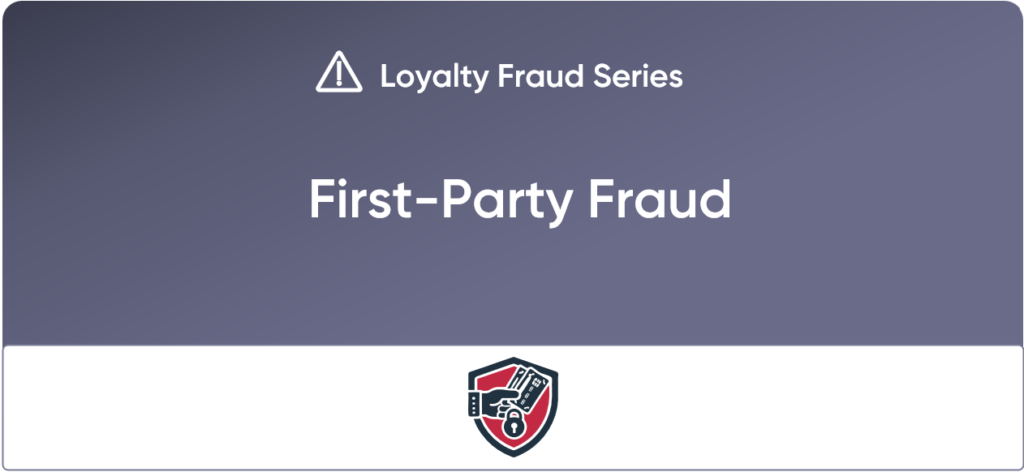
First-party fraud is a deceptive practice where a member of a loyalty program exploits the system for personal gain, often in ways that are difficult to detect.
This type of fraud can occur on a small scale but, if left unchecked, can significantly erode profits and undermine the trust that forms the foundation of customer loyalty. Loyalty managers and program operators must recognise the critical nature of first-party fraud and its potential impact on program effectiveness and brand integrity.
What is First-Party Fraud?
First-party fraud in loyalty programs involves fraudulent actions by the program’s own members, rather than external criminals. It typically occurs when members manipulate program rules or make false claims to gain unearned benefits.
Unlike third-party fraud, where outsiders hack or misuse accounts, first-party fraud is carried out by individuals who have legitimate access to the account.
Risks of First-Party Fraud
First-party fraud in loyalty programs generally manifests in two primary forms:
- Fraudulent Redemption Claims: this occurs when members process a redemption, such as redeeming points for a reward, and later contact customer service claiming the points were deducted without their knowledge or consent.
- Unauthorised Account Access: in this scenario, a member’s family or friends gain access to the loyalty account and redeem points without the primary account holder’s permission. This often leads to the account holder later claiming fraud, despite the redemption being processed with valid account details.
These risks pose significant challenges for program operators and demand robust detection and prevention strategies to maintain program integrity.
Mitigations for First-Party Fraud
To combat first-party fraud, loyalty program operators should implement comprehensive fraud prevention strategies:
- Clearly Defined Rules: establish clear, well-thought-out rules for your loyalty program from the start. By anticipating potential risks and addressing them in the rules, you can prevent many issues before they arise. Ensure these rules are communicated effectively to members and reinforced through your terms and conditions.
- Advanced Fraud Detection Systems: leverage technology to identify suspicious patterns, such as multiple accounts using the same IP address or geolocation data that does not match a member’s typical activity. Many loyalty technology solutions come with robust measures to help businesses identify and flag early warning signs of fraudulent activity.
- Customer Service Training: train call centre staff to document detailed notes for each claim, especially in cases where a member asserts unauthorised redemptions. Having a well-documented history can help flag repeat offenders.
- Fraud Monitoring Processes: regularly review detailed reports that track redemption and claim activities. This helps operators detect and respond to fraudulent behaviours early.
- Robust Terms & Conditions: ensure program terms and conditions clearly state that accounts showing signs of suspicious activity can be frozen or suspended, even if the correct sign-in details are used.
- Member Reimbursement Policies: have clear guidelines for handling legitimate claims of unauthorised redemptions. Where fraud is suspected, accounts should be suspended pending further investigation.
These multi-layered mitigation strategies can significantly reduce the risk of first-party fraud while maintaining member trust.
Examples of First-Party Fraud
Here are some common scenarios:
- High-Value Redemption Fraud: A member redeems points for a high-value reward (e.g., a flight or hotel stay) and then contacts customer service to claim the redemption was unauthorised. Despite evidence showing that the redemption was processed from their usual device and location, they assert their account was hacked.
- Family or Friend Access: A family member, using a shared computer, accesses the loyalty account and redeems points for merchandise. The primary account holder later claims these redemptions were fraudulent upon discovering the reduced point balance.
These examples highlight the challenges loyalty programs face in distinguishing genuine fraud from false claims. They also underscore the need for clear policies and robust monitoring.
Expert Advice on Fraud Prevention
As loyalty fraud continues to evolve, staying informed and proactive is crucial for program operators. Loyalty & Reward Co offer a comprehensive series of articles on loyalty program fraud, providing valuable insights and strategies to safeguard your program and ensure its effectiveness in driving customer acquisition, spend, and retention.
For bespoke guidance on protecting your loyalty scheme from first-party fraud and other security risks, consult our team of loyalty consultants. We provide tailored solutions to help you implement robust security protocols, mitigate risks, and ensure the long-term viability of your loyalty initiative
Acknowledgement
Thank you to Michael Smith, co-founder of the Loyalty Security Alliance and contributor to ‘Loyalty Programs: The Complete Guide’, whose expertise helped inform insights presented in this article.

